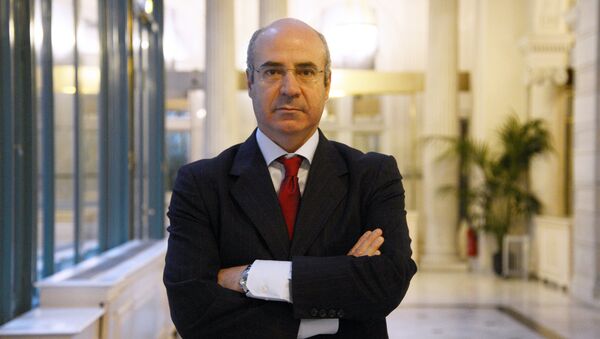WASHINGTON (Sputnik) — Katsyv faces civil forfeiture charges in the United States over his alleged connection to a massive tax fraud which in the opinion of Katsyv's lawyer was organized by Browder himself. In 2009, Browder stood before the US Senate, British parliament and stated that $230 million has been stolen from Russia in an embezzlement scheme exposed by his lawyer Magnitsky.
"We have found out that the only person who had both motive and opportunity to carry out the theft he has been talking about so long is Mr. Browder himself. The role of Magnitsky cannot be determined because he is dead," Katsyv’s lawyer Natalia Veselnitskaya said.
Money illegally withdrawn by UK millionaire William Browder from the United States to Russia had been used in various criminal affairs including the illegal purchase of Gazprom shares, she said.
"It all began in 1999 when the first money left the United States for Russia illegally, avoiding all the barriers…After getting into our country [Russia], money had been used in corrupt deals, in the insider trade, information leaks… and illegal purchase of Gazprom shares."
Between 1997 and 2005 at least 200 million Gazprom shares have been obtained using a scheme when Ziff Brothers Investments used offshore companies transferring funds into Russian companies for them to purchase shares, constituting a violation of the Russian legislation regarding Gazprom shares. Later these shares had been moved to a Cyprus company and then further on in the form of dividends.
In 2013, Russia sentenced Browder in absentia to nine years in prison for tax evasion and for falsely claiming tax breaks for hiring disabled persons. The court also ruled that Magnitsky developed and implemented a tax evasion scheme while working for the millionaire. Katsyv's lawyer Veselnitskaya maintains that Browder was behind the fraudulent activities her client is accused of.
Magnitsky was a Russian lawyer who revealed alleged corruption at the highest levels of the Russian government. He was detained in 2008 and accused of conspiracy and abatement for tax evasion. He died in the Matrosskaya Tishina pre-trial detention center in Moscow in 2009.
In late 2012, the United States adopted the so-called Magnitsky Act, which imposes travel bans and financial sanctions on Russian officials and other individuals believed to have been involved in Magnistky's death, the case against him and related issues. Russia responded by issuing its own blacklist, which includes US officials linked to human rights violations, some of whom were involved in the construction and maintenance of the Guantanamo Bay detention center.



